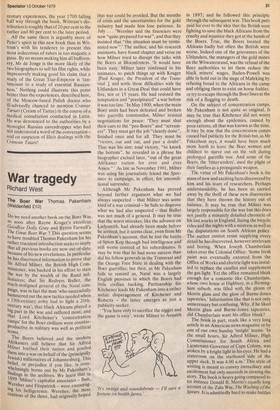War tragedy
Richard West
The Boer War Thomas Pakenham (Weidenfeld 210) Do we need another book on the Boer War SO soon after Rayne Kruger's excellent Goodbye Dolly Gray and Byron Farwell's The Great Boer War ? This question seems to have troubled Thomas Pakenham for his rather truculent introduction seeks to imply that all previous books are now out-of-date because of his new revelations, In particular he has discovered information to prove that Sir Alfred Milner, the British High Commissioner, was backed in his effort to start the war by the wealth of the Rand millionaires; that Sir Redvers Buller, the much-maligned general of the Natal camPaign, was in fact the man 'who successfully hammered out the new tactics needed when a 19th-century army had to fight a 20thcentury war'; that black Africans played a big part in the war and suffered most; and that Lord Kitchener's 'concentration camps' for the Boer civilians were counterproductive in military was well as political terms, The Boers believed and the modern Afrikaners still believe that Sir Alfred Milner loathed their nation and goaded them into a war on behalf of the (principally Jewish) millionaires of Johannesburg. This belief, or prejudice if you like, is overwhelmingly borne out by Mr Pakenham's findings in the archives. We learn that tit 1899 `Milner's capitalist associates — Belt, Nyernher and Fitzpatrick — were encouraging his belligerence, Wernher, the most cautious of the three, had originally hoped that war could be avoided. But the months of crisis and the uncertainties for the gold industry had made him lose patience. In July . . 'Wernher said the financiers were now "quite prepared for war", and that they insisted that "the situation must be terminated now": The author, and his research assistants, have found chapter and verse on how Milner tried to disrupt the talks with the Boers at Bloemfontein. *It would have been easy, Milner later confessed to his intimates, to patch things up with Kruger [Paul Kruger, the President of the Transvaal j, and settle those difficulties with the Uitlanders in a Great Deal that could have five, ten or 15 years. He had resisted the temptation and "precipitated" a war before it was too late.' In May 1900, when the main Boer units had been defeated and broken into guerrilla commandos, Milner resisted negotiations for peace: 'They must shut their ears to the "pro-Boers" and "screamers". They must get the job "cleanly done", finished once and for all. They must be "victors, out and out, and past a doubt". That was his aim: total victory, "to knock the bottom", he revealed in a phrase his biographer excised later, "out of the great Afrikaner nation for ever and ever Amen." As late as November 1901, Milner was using his journalistic friend the Spectator to campaign, in effect, for unconditional surrender.
Although Mr Pakenham has proved beyond further argument what we had always suspected — that Milner was some kind of a war criminal — he fails to disprove what we had also suspected — that Buller was not much of a general. It may be true that the worst mistakes, like the advance on Ladysmith, had already been made before he arrived, but it seems clear, even from Mr Pakenham's account, that he lost the battle of Spion Kop through bad intelligence and still worse control of his subordinates. It may be true that he had more success than did his fellow generals in the Transvaal and the Orange Free State in dealing with the Boer guerrillas; but then, as Mr Pakenham fails to remind us, Natal was a largely English province in which the Boers had little civilian backing. Partisanship for Kitchener leads Mr Pakenham into a rather unfair disparagement of Kitchener and Roberts — the latter emerges as just a publicity-seeker. 'You have only to sacrifice the nigger and the game is easy', wrote Milner to Asquith in 1897; and he followed this principle through the subsequent war. This book puts paid for ever to the idea that the British were fighting to save the black Africans from the cruelty and injustice they got at the hands of the Boers. True, the Boers treated the Africans badly but often the British were worse. Indeed one of the grievances of the Uitlanders, the managers of the gold mines on the Witwatersrand, was the refusal of the Boer authorities to let them reduce the black, miners' wages. Baden-Powell was able to hold out in the siege of IVIafeking by refusing bread to the Africans in the camp and obliging them to exist on horse fodder, or try to escape through the Boer lines at the risk of a flogging to death.
On the subject of concentration camps, Mr Pakenham is not quite so original. It may be true that Kitchener did not worry enough about the epidemics, caused by poor rations; all that was known at the time. It may be true that the concentration camps caused bad publicity for the British but, as Mr Pakenham says, it would have been much more harsh to leave the Boer women and children to starve out on the velt during prolonged guerrilla war. And sonic of the Boers, the 'bitter-enders', used the plight of their families as a propaganda weapon.
The virtue of Mr Pakenham's book is the mass of new and exciting facts discovered by him and his team of researchers. Perhaps understandably, he has been so carried away by the thrill of these new discoveries that they have thrown the history out of balance, It may be true that Milner was largely responsible for the war but this does not justify a minutely detailed chronicle of his last weeks in England, listing the bicycle rides and the nights with a mistress as well as the disputations on South African policy. The author cannot resist supplying every detail he has discovered, however irrelevant and boring. When Joseph Chamberlain takes over the Colonial Office: 'Some fresh paint was eventually extorted from the Office of Works and electric light was installed to replace the candles and supplement the gas light. Yet the office remained bleak enough for a romantic like Chamberlain, whose own house at Highbury, in a Birmingham suburb, was filled with the gleam ot Morris glass and the glow o‘f Burne-Jones tapestries.' Information like that is not only unnecessary but confusing. Why, if he liked Morris glass and Burne-Jones tapestries, did Chamberlain want his office bleak?
The book in part, reads like a very long article in an American news magazine or by one of our own Sunday 'insight' teams. 'In the small hours, Sir Alfred Milner. High Commissioner for South Africa and Lieutenant-Governor of Cape Colony, was woken by a bright light in his eyes. He had a stateroom on the starboard side of the upper deck. It was 4.00 a.m.' This style of writing is meant to convey immediacy and excitement but only succeeds in slowing the story. The book is heavy going compared to tor Instance Donald R. Morris's equally long account of the Zulu War, The Washing of the Spears. It is admittedly hard to make battles both exciting and comprehensible but it does not seem to me that Mr Pakenham has the gift.
While writing in exhaustive detail on Milner and Buller, his two special interests, Mr Pakenham almost ignores some of the other main characters of the Boer War. Cecil Rhodes appears briefly as a buffoon, which he was not. The Transvaal President Paul Kruger, disappears inexplicably from the middle of the story. Indeed, though Mr Pakenham says he has learned both Afrikaans and Dutch, he writes very little about the Boer side of the war.
The worst defect of this book, in which it shows up so badly compared to Goodbye Dolly Gray, is Mr Pakenham's failure to see the Boer War as tragedy. The Afrikaner historian Rayne Kruger splendidly caught the agony and the heroism of the Boers; that was to be expected. He also managed to make us feel why the British cause attracted diverse but idealistic people like Rudyard Kipling, Winston Churchill, Sir Arthur Conan-Doyle and Mary Kingsley; the lastnamed died while tending the fever patients.
The Boer War was tragic because it inspired good men and women on both sides of the battle line; still more because it exacerbated a hatred and a political feud which is very much with us still. The debate in England between the pro and anti-Boers is barely mentioned in Mr Pakenham's book yet it remains almost the most interesting aspect of that war. The pro-Boers then were precisely the sort of people who now are mostly fiercely against the Boers: the socialists, liberals and Irish Republicans. Their propaganda was laced with anti-semitic references to the money bags of Johannesburg.
A modern British left-winger, Jonathan Dimbleby, recently made a comparison between Hitler's Germany, the present government in South Africa and British rule in Northern Ireland. It is curious to be reminded that those who 80 years ago were against British rule in Ireland, also opposed British rule in South Africa and went on to support Hitler in Germany. One of the heroes of the 1916 Dublin rising, John MacBride, learned his soldiering on the side of the Boers and his wife Maud Gonne toured the United States during the Boer War in support of the Afrikaners against the British imperialists and the Jewish financiers. She went on to support Hitler, who at first received much support from the Left in both Britain and Ireland.
'Which side would you have supported in the Boer War?' is a challenging question to ask at a liberal or left-wing gathering. Unless one can unequivocally answer 'the British side', it is difficult to condemn modern South Africa. The disturbing conclusion one reaches from Mr Pakenham's book is that everything said by the Boers at the time about how they were under attack from wicked British'capitalism was entirely true. Can we expect to see Mr P. W. Botha emerge as one of the heroes of the modern Left?



































 Previous page
Previous page